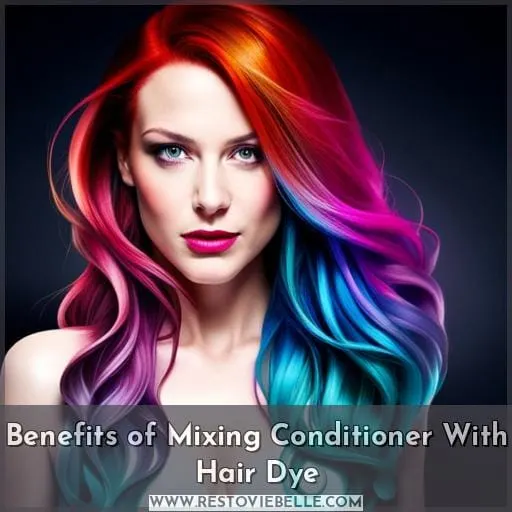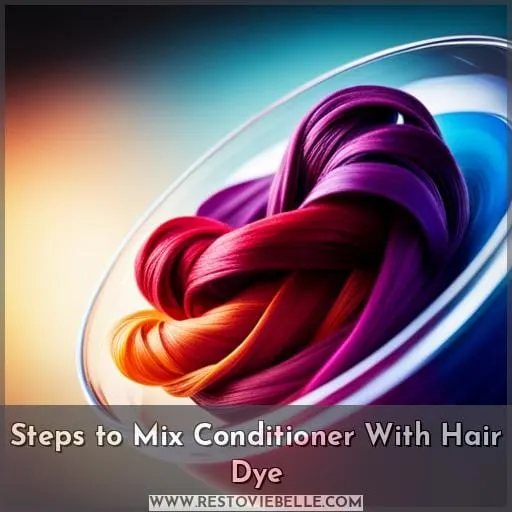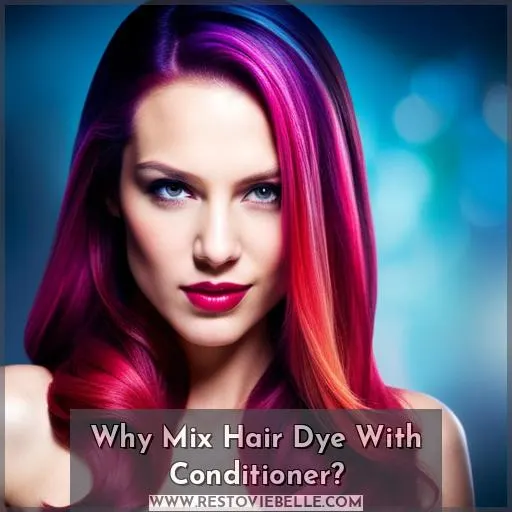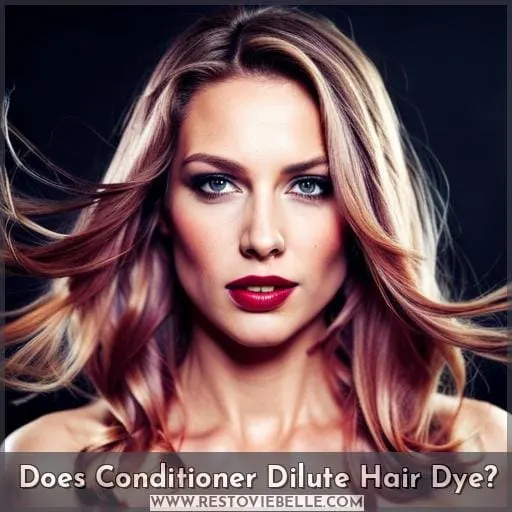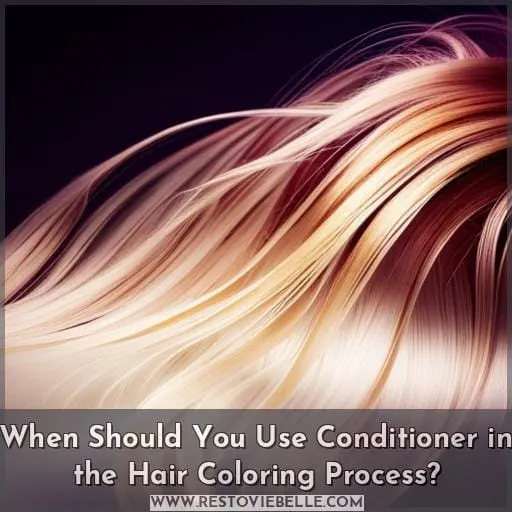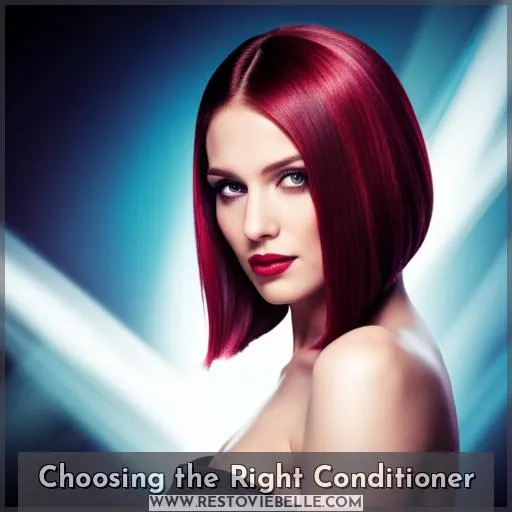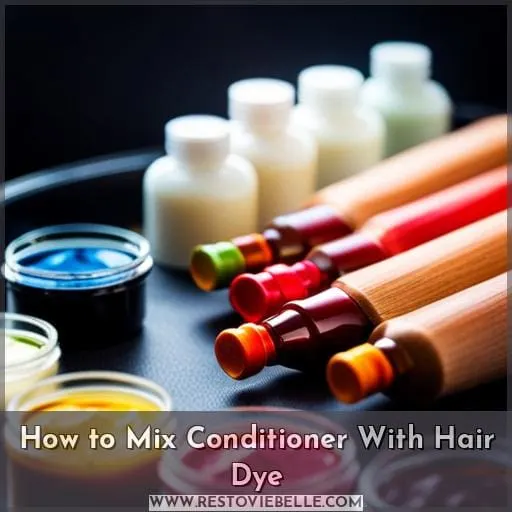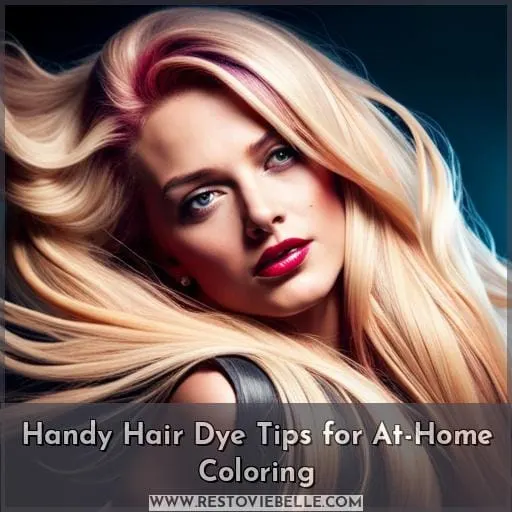This site is supported by our readers. We may earn a commission, at no cost to you, if you purchase through links.
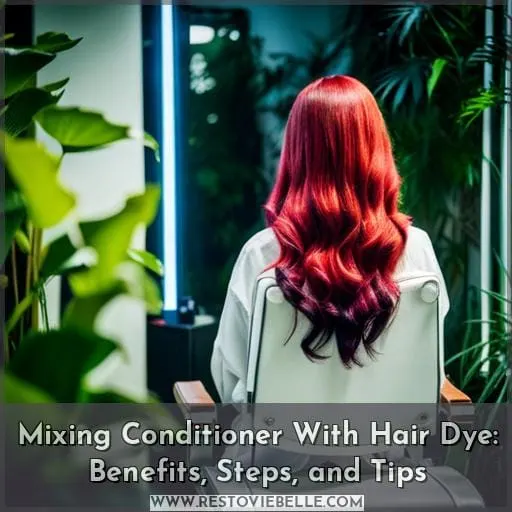 You’re saying hola to coloring your hair the way you want with this handy hair dye hack. Mixing conditioner into hair dye liberates your inner hair artist, unleashing the power to create custom shades and textures.
You’re saying hola to coloring your hair the way you want with this handy hair dye hack. Mixing conditioner into hair dye liberates your inner hair artist, unleashing the power to create custom shades and textures.
Simply grab your favorite fantasy hue, swirl in some pale conditioner, and voila! You’ve mastered a moisturizing dye blend with benefits galore.
Conditioner cuts harshness while lightening intense pigments for a softer look. Use this trick to revive faded color or concoct a fantasy shade that’s all your own.
With the right combo of conditioner and dye, you can unlock any vibrant vision for your tresses. So grab that bottle, squeeze in some conditioner, and stir up a shade that makes your spirit sing.
Table Of Contents
- Key Takeaways
- Benefits of Mixing Conditioner With Hair Dye
- Steps to Mix Conditioner With Hair Dye
- Why Mix Hair Dye With Conditioner?
- Does Conditioner Dilute Hair Dye?
- When Should You Use Conditioner in the Hair Coloring Process?
- Choosing the Right Conditioner
- How to Mix Conditioner With Hair Dye
- Handy Hair Dye Tips for At-Home Coloring
- Conclusion
Key Takeaways
- Choose a pale, protein-free conditioner to mix with vibrant dye.
- Use a 1:3 ratio of dye to conditioner for subtle, natural color.
- Mixing conditioner with dye helps maintain hair softness and protects color.
- Before and after dyeing, condition hair for best results.
Benefits of Mixing Conditioner With Hair Dye
Mixing conditioner with hair dye offers multiple benefits for your tresses. It helps protect hair, keeps hair smooth, lightly dilutes dye pigment for a softer color, and revives faded existing dye.
Hair Protection
You’ll safeguard your strands when you blend color with cream. Conditioner shields every fiber, sealing in vivid vibrancy. Nourishing oils strengthen and prevent breakage. Protein reconstructs damaged, over-processed hair for lasting integrity.
Each strand weaves itself anew. Revive lackluster color and illuminate your locks with radiant protection. Conditioners let you color without compromise, embracing your true hue in a healthy halo of hair.
Preserves Smooth Texture
Adding conditioner keeps your hair smooth as silk when coloring.
- Conditioner creates a barrier between the hair cuticle and dye molecules, preventing cuticle damage that leads to dry, coarse texture.
- The emollients in conditioner seal the cuticle down, maintaining a smooth exterior.
- Conditioner’s slip effect allows for gentler detangling to prevent snags and knots.
- Opt for hydrating formulations with natural oils and butters that nourish hair and enhance softness.
Mixing conditioner with hair dye offers multiple benefits for maintaining hair health and vibrancy. Choosing the right conditioner formula allows you to color your hair while keeping it touchably smooth.
Lightens Dye Color
The hue emerges muted when stirred into the cream. Mixing conditioner with hair dye lightens color intensity for a softer, more natural look. To achieve this effect, select vibrant permanent or demi-permanent dyes and pale conditioners that don’t contain protein to avoid damaging hair.
Use one part of direct dye to three parts of conditioner as a guideline for combining colors. However, strand testing is recommended before full application to achieve desired results. Gradual application by adding small amounts of dye directly into the bowl containing the majority portion of conditioner can also be used for lighter color gradation and tonal variations between applications over time.
Experimenting with different mixing ratios will help you find your ideal result!
Revitalizes Existing Color
Pour refreshing rain upon your fading blossoms, reviving their radiance. Coat hair in energizing elixirs, stirring the dye cauldron with conditioner to concoct a fade-fighting formula. Let time-saving techniques like custom color conditioners and between-dye revitalizers nourish your tresses.
Embrace effortless at-home options for keeping your vibrant hues alive. Conditioner concoctions revitalize faded color minus the damage, blending away brassiness and toning down tones. With the right mixes, maintain your bright blossoms through color boosting and refreshing in the comfort of home.
Steps to Mix Conditioner With Hair Dye
To mix conditioner with hair dye, start by choosing a vibrant dye and selecting a pale conditioner. Next, combine 1/3 cup of the chosen conditioner with 1 tablespoon of the selected dye in order to mix thoroughly.
Choose Vibrant Dye
Select a dye that energizes you. Consider your current hair color and desired intensity when choosing a semi-permanent dye. Some dyes blend better than others based on your base shade. Pink dyes complement darker brunette tones, while blues pair nicely with light to platinum blondes.
Remember to match the dye’s vibrancy to your goals. More concentrated colors like Manic Panic produce bolder results. Squeeze out a dime-sized drop and mix thoroughly into conditioner for a customized color.
Select Pale Conditioner
Yeah, grab an insanely large bottle of that ghostly white conditioner to make your rainbow locks even more magical, girl!
- Opt for a protein-free pale conditioner to avoid distorting your vibrant dye colors.
- Keep an eye on the conditioner’s consistency – not too thick or runny.
- Make sure it’s free of oils that could alter the dye hue.
- Check reviews confirming it works well for mixing.
You want a conditioner that lets your vivid dye shine while nourishing your strands. We don’t make rainbows with murky puddles, darling.
Combine ⅓ Cup Conditioner With 1 Tbsp Dye
Now grab your tablespoon and stir in just enough dye to get the desired intensity. More dye means bolder color, while less gives a subtle look. Test a strand first, since some conditioners dilute more than others.
Let the mixture sit for the time specified in the dye instructions. For best results, choose a dye tone that complements your natural hair color. With the right combination of conditioner and dye, you’ll achieve your ideal shade.
Mix Thoroughly
Stir the mixture until the dye and conditioner blend into a creamy, unified potion. Mix thoroughly with a dye brush in a circular motion until the color is evenly distributed. Adjust the water or dye ratio for your desired consistency and intensity. Do a strand test for subtle results.
Let the mixture sit based on the dye’s instructions before application. Considering application time and mixing techniques helps achieve your ideal hue.
Apply as Directed
Secure your hair into sections to maintain saturation from roots to ends as you work the conditioner-dye mixture through. When applying the blended mixture, follow the manufacturer’s recommended timing for your chosen dye and conditioner mix based on desired color intensity.
First, perform initial strand testing on a small hair section before full application. Choose the correct dye-to-conditioner ratio based on your hair color, type, and the intensity you want. Check hair frequently during the timed application to ensure the dye is not over-processed.
Why Mix Hair Dye With Conditioner?
You can get more subtle color results by diluting the intensity of hair dye with conditioner. Adding conditioner to semi-permanent dyes softens their vibrancy for a delicate look. Conditioners with nourishing oils hydrate hair and scalp during processing. Diluting protects hair health by minimizing exposure to harsh chemicals that may irritate hair follicles.
Popular techniques use one part dye with two parts conditioner. White, creamy formulas prevent distorting dye color. Diluted dyes last 4-6 weeks with proper upkeep. Regular conditioning treatments prolong vibrancy between fresh applications.
Transformation occurs gradually through accumulated conditioning sessions. With thoughtful prep and execution, you can safely use dilution’s power for exquisite, subtle hair color.
Does Conditioner Dilute Hair Dye?
While exploring new hair color trends, be careful when mixing conditioners and dyes. You don’t want your vibrant hues muted into a dull tone. Blending conditioner with permanent dyes can make them less intense.
However, demi-permanent and semi-permanent colors remain fairly bright. Mindfully approach mixing techniques, using plastic over metal bowls. Choose quality conditioners and direct dyes, gradually adding small amounts to see the effect on color intensity.
Follow recommended ratios to get your desired vividness without too much conditioning.
Although this trend risks diluting permanent pigments, when thoughtfully done on suitable dyes, it can give radiant hues and maintain hair health.
When Should You Use Conditioner in the Hair Coloring Process?
Pre-color your hair with a hydrating conditioner to boost moisture, protect strands, and ensure an even application. Once you’ve rinsed the dye, apply a nourishing conditioner to rehydrate hair and lock in the vibrant shade.
Regular conditioning keeps color lively between dye sessions while preventing dryness. To subtly enhance or refresh your hue, incorporate a semi-permanent dye into your usual conditioner.
With the proper techniques, selectively add pigment where needed for flawless maintenance. Conditioner mixing allows you to gently tone down brassiness or brilliance for a seamless, multi-dimensional look.
Continually nourish your tresses to uphold the integrity of your shade.
Choosing the Right Conditioner
When coloring your hair, choosing the right conditioner to mix with the dye is important for beautiful results. For subtle, even color, use a hydrating, protein-free conditioner such as Mielle Organics Protein Free Hydrating Conditioner with Mongongo Oil in a 1:3 dye-to-conditioner ratio, stirring thoroughly before applying to wet hair as directed on the dye package.
Benefits of conditioner mixing
Mixing conditioner offers protection and a smooth texture, while lightening and revitalizing your dye’s color.
- Protects hair from damage.
- Maintains hair smoothness.
- Lightens dye color subtly.
- Revitalizes faded dye color.
When you mix conditioner with hair dye, you benefit from hair protection during application and conditioning afterwards. The conditioner helps lighten and prolong the dye color for a more subtle result.
Blending conditioner enables gradual color building while nourishing hair versus using harsh permanent dyes alone.
Recommended conditioners for mixing
Tresses require the gentlest cleansers when dyed. Select unpigmented conditioners like Love Beauty Planet’s Bulgarian Rose infusion. Its botanical oils extend color vibrancy without damaging silicone. Another option, Keracolor’s paraben-free purple conditioner, incrementally builds pigment.
For protein-sensitive strands, Mielle Organics’ Mongongo oil-enriched formula deeply moisturizes while retaining dye.
Steps to mix properly
Lovingly follow your heart as you blend colors to express your inner light. To preserve vibrancy when mixing semi-permanent dye with conditioner, use a 1:3 dye to conditioner ratio. Thoroughly stir one tablespoon of dye into one third cup of conditioner. Test a strand before full application.
Let sit for 5-30 minutes for the desired intensity. Rinse until the water runs clear.
How to Mix Conditioner With Hair Dye
When using hair dye, mixing in conditioner is a great way to customize and personalize your color results. For full, vibrant color, apply the dye-conditioner mixture thoroughly from roots to ends and leave on for the recommended processing time.
For a more gradual color buildup, use the mixture as a daily conditioner, leaving it on for just 5-10 minutes before rinsing. Either way, be sure to use sulfate-free shampoo and hydrating conditioner in between sessions to maintain your new hue.
Full Application
After thoroughly mixing, apply your custom color blend through damp strands from tip to root for full coverage. Ensure even distribution and consider the environment when using dyes outdoors. To get the most out of application techniques: vary colors for a unique look; mix 1/3 cup conditioner with 1 tablespoon dye; maintain tips by coloring every 4-6 weeks; time applications according to instructions – longer sets yield more intense results.
For best results, use sulfate-free shampoo 72 hours after dyeing and opt for high-quality conditioners that won’t strip hair’s natural moisture or disrupt color vibrancy.
Gradual Application and Maintenance
Slowly add dye into your conditioner over time for a gradual, subtle color that you can maintain between full dye jobs. Instead of one heavy application, add a dash of semi-permanent dye to your conditioner each wash for a customized, temporary tint.
Build your ideal intensity with steady infusions. Refresh faded color between salon visits with a maintenance routine of gentle, conditioning color boosts. Play with temporary color options for a subtle pop of fun fantasy tones. Skip the harsh chemicals and embrace effortless, conditioned color.
Handy Hair Dye Tips for At-Home Coloring
Before you embark on your at-home hair dye adventure, take the time to familiarize yourself with a few helpful tips.
Always do a patch test to ensure that your scalp and strands can handle the chemicals in hair dye.
Leave your hair down during application for easier coverage.
Try adding water and give it a light massage as you apply color.
Never use metal bowls or clips when mixing dyes, instead opt for plastic alternatives.
Lastly, if any stains remain after rinsing out the color, use olive oil or toothpaste to help remove them.
With these handy tips in mind, you’ll be well on your way towards achieving salon-quality results!
Always Do a Patch Test
Fore coloring, do a patch test on your hair.
Always do a patch test of hair dye even if you’ve used it before. Allergies can suddenly develop.
- Cleanse a 1 inch square on your inner arm.
- Apply dye according to instructions.
- Leave on for 24-48 hours.
- Check for redness, itching, swelling.
- If there is no reaction, proceed with caution.
Exercise safety first when coloring hair at home.
Leave Hair Down During the Application Process
Let your locks flow freely while coloring for even application. Keeping hair down during the dyeing process allows for natural movement and flow of product through strands. This positioning minimizes staining by letting gravity work and allowing more control over sectioning for full saturation.
With hair loose, you can easily maneuver sections and see where dye has been applied for consistency, while protecting skin and avoiding excessive scalp contact.
Try Adding Water and a Light Massage
You could blend clear water and give your scalp a feather-light massage for optimal absorption. The addition of water allows for gradual application and further dilution of the color for subtle results.
Focus the gentle massage on the roots to enhance color vibrancy through improved circulation.
Never Use Metal Bowls or Clips
After securing the plastic bowl in place, grab the wooden spoon for mixing. Metal bowls and clips can react with hair dye chemicals, resulting in altered color. Opt for plastic, glass, or wooden bowls instead. Use plastic clips and hair ties during the coloring process to avoid any chemical reactions with metal clasps that could compromise your intended hair hue.
Rinse hair thoroughly after the designated processing time to remove all excess dye.
Use Olive Oil and Toothpaste to Remove Dye Stains
When salon staining happens, gently rub olive oil and toothpaste on skin to remove semi-permanent dye stains. The oil’s moisturizing properties loosen dye particles while the silica in toothpaste serves as a mild abrasive.
Gently massage the mixture into your skin using circular motions until the stain fades. Rinse with warm water. Repeat if needed. This handy home remedy gently lifts dye without irritation. Avoid using this method near eyes or other sensitive areas. With some elbow grease, olive oil and toothpaste can lift stubborn hair dye stains.
Conclusion
Curious about experimenting with conditioners to mix with hair dye? Have you considered the benefits, steps, and tips before taking the colorful plunge? What conditioner will you reach for to achieve your ideal hue? With the knowledge shared here, you can confidently and gently enhance your strands.
Just be sure to do a test strand first. Then let your colorful creativity shine, with locks flowing with a radiant, conditioned glimmer. When mixed properly, conditioners to mix with hair dye allow for stunning, moisturized color that you’ll just adore.
